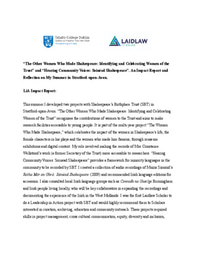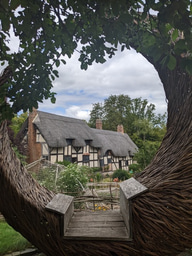Summer 2 Blog: Reflecting, Growing and Giving Back.

My approach to leadership when I entered this programme was grounded in the idea that a major part of leadership is to support others to self-advocate through art if they feel underrepresented or invisible. The most impactful leaders in my life were never in the spotlight. My aim as a Laidlaw Scholar was to give back to the people who created opportunities that supported me and to gain the skills I needed to open more doors to the arts for people in my local community. I did not feel that I needed to travel across the world to find people who were disadvantaged in some way, as there are many people in our communities who need support.
My research project in summer one involved evaluating if the ‘Erthe upon Erthe’ poem painted on a mural which was whitewashed in the Stratford-upon-Avon Guild Chapel could have been accessed by Shakespeare and his contemporaries in other publications. I compared John Shakespeare’s role in signing the order for the murals in the Chapel to be whitewashed (which survived and were uncovered in 2016) with the scene in Shakespeare’s play The Winter’s Tale where Hermione poses as a statue until she perceives it to be safe to reveal herself to her repentant husband. What I found in my research was that there was an interdisciplinary network of artists, publishers, writers and town council members who were simultaneously compliant and subversive when faced with censorship laws. This period of research allowed me to further develop my critical thinking skills through examining archive material around town records, legislation, broadside publications, visual artworks and even a First Folio (which you can read about in my summer one blog). As we have a limited amount of information around Shakespeare’s personal life, and opposing censorship came with severe consequences, my work had to avoid conjecture and remain based in evidence that survives from the period.
Following the first summer of research, I collaborated with my fellow Laidlaw Scholars to organise a seminar series so that we could share our research with our university and promote the programme to potential new applicants. Seeing my fellow scholars taking the time to share their work, not just with the university but with each other was one of the most rewarding parts of the programme. The planning process and the opportunity to present our research required us to put communication and collaborative skills into practice, as well as strategic planning and project management skills. We hope it is a model that future cohorts of Laidlaw Scholars can use to share their work with everyone at Trinity College Dublin.
I had a fantastic Leadership in Action experience in Stratford-upon-Avon where I was able to put into practice the skills that I have been developing throughout the course of this programme. The placement tested my flexibility, resilience, cross cultural communication skills and project management skills. I had many ethical research and leadership questions to consider. The project we began to develop in the lead up to the placement was called ‘The Other Women Who Made Shakespeare: identifying and celebrating women of the Trust’. My work focussed on a Secretary of the Trust, Mrs. Constance Wellstood. During this project I felt it was important to respect Mrs. Wellstood’s personal life, and the wishes of her surviving family as the Trust only housed information related to her professional work. I was involved with a translation workshop where I identified a very limited number of Irish language items in the Collections. The Irish community were very responsive to my questions and felt that their culture and language should be represented in the Collections, so I developed a second project called ‘Hearing Community Voices: Soinéid Shakespeare’ which involved creating a framework where any minority language or culture can be included in the Collections. As an Irish person I felt that it was important to widen the field of representation to the languages that were irreparably damaged by colonialism, as Shakespeare’s works were an important part of the educational curricula imposed by the British Colonial project. It is an exciting starting point for the community to develop according to their needs without diluting their voices and experiences. During my LiA, I listened to the community, encouraged their voices to take centre stage, trusted my instincts and embraced flexibility. I learned to develop a project idea that was simple, impactful, inclusive and sustainable. Especially when working in an institution where projects go through chains of administration for approval, the simpler the idea, the more time effective and impactful it could be.
My leadership skills are constantly evolving. I find hearing about the experiences of Laidlaw Scholars across the world incredibly inspiring. In the future I intend to continue running the ‘Hearing Community Voices’ project with SBT and other language/cultural groups. Most importantly, I would like to bring the skills I have gained as a Laidlaw Scholar back home, where I have always felt that opportunities for young people to access the arts have been either lacking, or constantly struggling to survive. I hope to be the kind of leader who is curious, empathetic and constantly listening for the sounds and signs of anyone who feels invisible but reaches for a place on any kind of stage to share their experiences and hope for positive change.





Please sign in
If you are a registered user on Laidlaw Scholars Network, please sign in